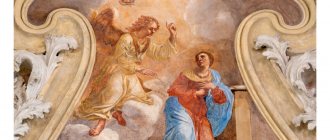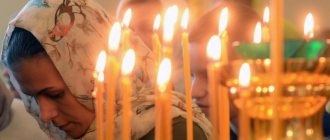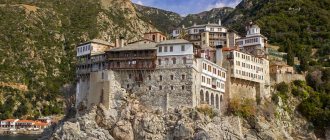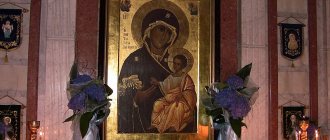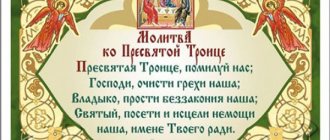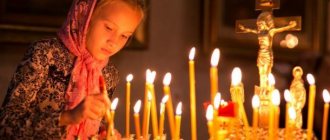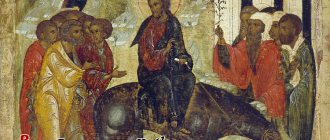The emergence of a tradition
On Victory Day, all Orthodox churches commemorate the deceased soldiers and martyrs who did not return from the battlefields of the Second Patriotic War. The Russian army constantly received strengthening of spirit through prayers and icons of saints, who protected them in difficult times of hardship and hostilities.
On May 9, the Russian Orthodox Church commemorates deceased soldiers
Faith, Fatherland and people were and are sacred values for the Russian warrior, and, despite the persecution of the church, during the war years the Russian Patriarchate, led by Metropolitan Sergius, shared all the hardships of the war years.
Churches not only held services, but also collected funds and things to help soldiers fighting on the battlefield. The tank column named after Dmitry Donskoy was formed with donations made by Christians in Orthodox churches.
The commemoration of the dead in 2022 will take place in the same way as it took place in 2022, and will take place in 2022.
St. George the Victorious - a saint who was not afraid of either the authorities or death itself
Saint George was born into a noble and pious Christian family in Lebanon, the city of Beirut. He enlisted in the military and quickly advanced as a capable and physically tough soldier, becoming a commander of a thousand.
Soon he was noticed by the Roman Emperor Diocletian himself - he had the talent of an autocrat, the Empire could have flourished under him, if not for his fanatical devotion to the Roman gods: he killed people of other religions, wanting to unite the entire Empire in faith in his gods. Naturally, the majority of the inhabitants of the empire were pagans and it was not difficult for them to add the emperor himself and the spirits he worshiped to the host of their gods. Christians considered Christ alone to be God. Diocletian went down in history as one of the most severe persecutors of Christ's disciples: he tortured them, trying to force them to renounce their faith.
Saint George, accompanying the emperor, once found himself at the trial of Christians. Having heard the verdict of a terrible execution, he realized that he could no longer remain silent about his faith - perhaps, among military activities, he rarely thought about asceticism and prayer, simply fulfilling his military duty and sometimes turning to God. However, seeing the torment of his fellow believers, the saint gave away his inheritance (his parents had died by that time), released the slaves and confessed Christ before Diocletian, denouncing the emperor himself of cruelty and injustice. In front of all the nobles, he spoke about the unrighteousness of the ruler’s order to persecute Christians.
The emperor subjected the courageous young man to terrible torture, thanks to the patience of which he was glorified among the great martyrs, and after refusing to renounce Christ, he was executed by beheading.
Establishing the tradition of commemorating the dead on May 9
In 1994, on December 4, the Council of Bishops of the Russian Orthodox Church established the tradition of commemorating on May 9 all those who fell in battles for the Motherland, people and faith, as well as all those tortured in concentration camps and who died in captivity.
During the funeral service, a prayer is read in churches.
Invincible, incomprehensible and strong in battle, Lord our God! You, according to Your inscrutable destinies, sent the Angel of Death under his roof, to the village, to the sea, and to the battlefield from the weapons of war, spewing out terrible and deadly forces, destroying the bodies, tearing apart the limbs and crushing the bones of the warriors; We believe that according to Your, Lord, wise vision, such death is accepted by the defenders of the faith and the Fatherland.
We pray to Thee, Most Blessed Lord, remember in Thy Kingdom the Orthodox soldiers who were killed in battle, and receive them into Thy heavenly palace, as wounded martyrs, stained with their own blood, as if they suffered for Thy Holy Church and for the Fatherland, which Thou hast blessed, as Thy heritage .
We pray to Thee, accept the warriors who have gone to You into the hosts of the hosts of the Heavenly Forces, accept them by Thy mercy, as those who fell in battle for the independence of the Russian land from the yoke of the infidels, as if they defended the Orthodox faith from enemies, who defended the Fatherland in difficult times from foreign hordes; Remember, Lord, and all those who fought a good deed for the ancient preserved Apostolic Orthodoxy, for the Russian land that You have chosen, sanctified and holy in its language, and the enemies of the Cross and Orthodoxy offered both fire and sword.
Receive in peace of soul your servants (names), who fought for our prosperity, for our peace and tranquility, and grant them eternal rest, as they saved cities and towns and defended the Fatherland with themselves, and have mercy on the Orthodox soldiers who fell in battle with your mercy, forgive them everything sins committed in this life in word, deed, knowledge and ignorance.
Look with Your mercy, O Most Merciful Lord, on their wounds, torment, groaning and suffering, and impute to them all this as a good deed and pleasing to You; Accept them by Thy mercy, having endured fierce sorrow and hardship here, in need, cramped conditions, in labor and vigil, there was hunger and thirst, you endured exhaustion and exhaustion, you were considered like sheep of the slaughter. We pray to Thee, Lord, that their wounds will be medicine and oil poured out on their sinful sores.
Look down from heaven, O God, and see the tears of the orphans who have lost their fathers, and accept the tender prayers of their sons and daughters for them; hear the prayerful sighs of fathers and mothers who have lost their children; hear, O most gracious Lord, the inconsolable widows who have lost their spouses; brothers and sisters crying for their relatives - and remember the men killed in the strength of their strength and in the prime of their years, the elders, in the strength of spirit and courage; look at our heartfelt sorrows, see our lamentation and have mercy, O Most Good One, towards those who pray to You, Lord!
Thou hast taken away our dear ones from us, but do not deprive us of Thy mercy: hear our prayer and mercifully accept Thy servants (names) whom we remember ever since, who have gone to Thee, call them to Thy palace, like valiant warriors who laid down their lives for faith and the Fatherland in the fields battles; accept them into the host of Your chosen ones, as those who served You with faith and righteousness, and rest them in Your Kingdom, like the martyrs who went to You wounded, ulcerated and betraying their spirit in terrible torment; brought into Your holy city all Your servants (names) who are ever remembered by us, like valiant warriors who fought courageously in the terrible battles of which we remember them; their garments there are in fine linen, bright and clean, as here they have whitened their vestments in their blood, and are worthy of the crowns of martyrdom; make them collectively participants in the triumph and glory of the victors who fought under the banner of Your Cross with the world, flesh and the devil; place them in the host of glorious passion-bearers, good-victorious martyrs, the righteous and all Your saints. Amen.
The Orthodox Church never abandoned its people during wars, helping them with consolation, prayers and material assistance.
On Victory Day, all Orthodox churches commemorate those killed during the war.
When excavating the graves of soldiers, archaeologists more than once found crosses and a handwritten Psalm 90, enclosed in a Komsomol or party card. Of course, at that time no one advertised God’s help. However, legends circulated among the howlers about how the Bible saved them from a bullet, and those who left with the words “God forbid” always returned.
Read about commemorating the dead:
- Memorial service for the dead
- Orthodox burial rite
- Dmitrievskaya memorial Saturday
Text of prayer during a memorial service in the temple
Small funeral litany
Priest: Let us pray again and again in peace to the Lord.
Lik: Lord have mercy.
Priest: We also pray for the repose of the souls of the departed servants of God (name), and for them to be forgiven for every sin, voluntary and involuntary.
Lik: Lord have mercy.
Priest: For may the Lord God grant their souls, where the righteous may rest.
Lik: Lord have mercy.
Priest: We ask for the mercy of God, the Kingdom of Heaven and the forgiveness of their sins from Christ the Immortal King and our God.
Lik: Lord grant.
Deacon: Let us pray to the Lord.
Lik: Lord have mercy.
The priest says a prayer secretly: God of spirits and all flesh, having trampled down death and abolished the devil, and given life to your world, Lord Himself give rest to the souls of your departed servants, (name), in a bright place, in a green place, in a place of peace; Illness, sadness and sighing will no longer escape. Every sin committed either in word, or in deed, or in thought, as a good lover of mankind, God forgives, as if no man will live and not sin; You are One besides sin, Your righteousness is righteousness forever, and Your word is truth.
Exclamation: For You are the resurrection, and the life, and the rest of Your fallen servants, (name), Christ our God; and we send up glory to You, with Your beginningless Father, and with Your Most Holy, and Good, and Life-giving Spirit, now and ever, and unto ages of ages, Amen.
Random coincidences or acts of God
- On June 22, 1941, on the first day of the beginning of the Second Patriotic War, when Hitler’s troops attacked the Soviet Union, services were held in Orthodox churches in honor of all the saints who rest in the land of Rus'.
- The Soviet counter-offensive near Moscow began on December 6, when the church celebrates the day of memory of Alexander Nevsky.
- On the day of veneration of the apostles Peter and Paul, July 12, 1943, Russian army troops went on the offensive near Kursk. The Battle of Kursk was won.
- On November 4, the entire Orthodox world venerates the Kazan Icon of the Mother of God. It was on this day in 1943 that Kyiv was liberated.
- The Resurrection of the Lord in 1945 fell on May 6, on the same day the Russian Orthodox Church commemorates St. George the Victorious. In 1945, the war practically ended on this day. On May 9, the German surrender agreement was officially signed.
- On Trinity Day, June 24, Moscow hosted the first Victory Parade.
Now, when more than 70 years have passed, as before, grateful descendants in prayers remember those who died during the wars and pray for the repose of their souls.
Prayer to St. George the Victorious “Shield and Sword” from visible and invisible enemies
A strong prayer to St. George the Victorious from visible and invisible enemies sounds like this:
As a protective prayer, you can use any prayer to St. George the Victorious from a special collection. Also often prayer texts are printed on the back of the Icon. It is important to use the prayer that evokes a response in the soul. If you listen to yourself, the chosen prayer to St. George will become a reliable shield. It will protect you from any external negative influence.
The classic prayer from enemies goes like this:
Listen to the prayer to St. George the Victorious:
The role of the Russian Church in the Patriotic War
During the war, the Orthodox Church took an active part in the moral, physical and spiritual support of soldiers and citizens who remained both in the occupation and in the rear.
Despite the fact that in the 40s the communists banned religious services, many priests were shot or exiled to Siberia, in wartime people reached out to God for help and the ruling elite remained silent.
The Church honors warriors who died for their native land with special love.
Metropolitan Sergius personally typed an appeal to the priests and flock and distributed it among the people, conveying the prophetic message that victory would be for the Russians. From that time on, the destruction of Orthodoxy was stopped, priests returned from exile, parishioners flocked to churches. With Stalin's permission, a Council was held, at which a Patriarch was elected, Metropolitan Sergius became him.
The priests served not only in churches, but also on the front line, with weapons and a cross in their hands. The foreman of the Soviet army Lobachev, awarded many orders and medals, who ended the war in Prague, was in fact a priest, the future Archimandrite Leonid.
With the rank of major, he ended the War of Eternals, who in the future would be chosen as the Patriarch of Moscow and All Rus'. The Orthodox know him as St. Pimen.
Many warriors, having survived the horrors of war, made a vow to God and subsequently became priests, devoting their lives to the Creator.
Metropolitan Alexy of Kalinin and Kashin was a machine gunner during the war. Kramarenko, a holder of the Order of Glory of three levels, served as a deacon in the Kiev Church all his life. This list can be continued indefinitely.
Important! When commemorating soldiers, clergy especially venerate Saint Luke, who was a priest and surgeon during the war.
Prayers to St. George the Victorious for sporting victories
If you are interested in the victory of your children, loved ones or acquaintances in sports competitions, then you can turn to St. George the Victorious and ask for intercession and help. After all, his belief in you will strengthen him and lead him to his goal. And you need to turn to the great martyr with prayer for the competition to win with the following words:
“Miracle-worker, Victorious George! I turn to you as a saint strengthened in faith, do not refuse me, God’s servant (name), the next help. I believe in Christ, like you, and I ask for strength to win the competition. I will not refuse the weak, but I will bypass the strong. Let it be so. Amen"
You can also make special prayers for your daughter and for your own son, so that protection will always be with them.
St. George the Victorious helps to win.
We often associate “Victory” with great historical actions. But we all win our own tiny victories every day. For some, this is a triumph over idleness, for others - over illnesses, for others - over their own addictions. Every day, praying in the mornings and evenings, we cry out for triumph over the prince of darkness, the devilish temptations. In this we will especially be helped by prayers for victory to St. Archangel Michael, the chief of the angelic warriors, and St. George the Victorious. In the Christian faith, these saints are considered crushers of dark forces, support in the fight against them, and in their images they are depicted as slaying the unclean spirit in the form of a serpent.

